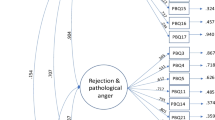Summary
The Parental Bonding Instrument was translated into Spanish and administered to a sample of 205 Spanish primiparae 3 days after childbirth. Reliability, factorial structure and predictive validity for affective disorders were evaluated. The Spanish version of the PBI has psychometric features similar to those described in other cultures. However, the results suggest that in future research the predictive power of the “Control” factor in affective disorders might be improved by splitting it into two subfactors: “Overprotection” and “Restraint”.
Similar content being viewed by others
References
Bowlby J (1976) The making and breaking of affectional bonds. I. — Aetiology and psychopathology in the light of attachment theory. Br J Psychiatry 130: 201–210
Parker G, Tupling H, Brown LB (1979) A parental bonding instrument. Br J Med Psychol 52: 1–10
Zweig-Frank, Paris J (1991) Parents, partners or personality? Risk factors for post-natal depression. J Affective Disord 21: 245–255
Gomez J (1984) Learning to drink: the influence of impaired psychosexual development. J Psychosom Res 28: 403–410
Bernardi E, Jones M, Tennant C (1989) Quality of parenting in alcoholics and narcotics addicts. Br J Psychiatry 154: 677–682
Goldney RD (1985) Parental representation in young women who attempt suicide. Acta Psychiatr Scand 72: 230–232
Byrne CP, Velamoor VR, Cernovsky ZZ, Cortese L, Losztyn SA (1990) A comparison of borderline and schizophrenics patients for childhood life events and parent-child relationships. Can J Psychiatry 35: 590–595
Parker G (1981) Parental reports of depressives. An investigation of several explanations. J Affective Disord 3: 131–140
Parker G (1983) Parental “affectionless control” as an antecedent to adult depression. A risk factor delineated. Arch Gen Psychiatry 3: 131–140
Parker G, Kiloh L, Hayward L (1987) Parental representations of neurotic and endogenous depressives. J Affective Disord 13: 75–82
Plantes MM, Prusoff BA, Brennan J, Parker G (1988) Parental representations of depressed outpatients from U.S.A. sample. J Affective Disord 15: 149–155
Birtchnell J (1988) Depression and family relationships. A study of young, married women on a London housing state. Br J Psychiatry 153: 758–769
Joyce PR (1984) Parental bonding in bipolar affective disorder. J Affective Disord 7: 319–324
Pinillos JL (1973) Cuestionario de personalidad CEP. TEA, Madrid
Wing JK, Birley JLY, Cooper JE, Graham P, Isaacs A (1967) Reliability of a procedure for measuring and classifying “present psychiatric state”. Br J Psychiatry 113: 499–515
Hamilton M (1960) Rating scale for depression. J Neurol Neurosurg Psychiatry 23: 56–62
Finlay-Jones R, Brown GW, Duncan-Jones, Harris T, Murphy E, Prudo R (1980) Depression and anxiety in the community: replicating the diagnosis of a case. Psychol Med 10: 445–454
Streiner DL, Norman J (1989) Health measurement scales. Oxford University Press, Oxford
Parker G (1979) Paiental characteristics in relation to depresive disorder. Br J Psychiatry 134: 138–147
Parker G (1989) The Parental Bonding Instrument. Psychiometric properties reviewed. Psychiatr Dev 7: 317–335
Cubis J, Lewin T, Dawes F (1989) Australian adolescents perceptions of their parents. Aust N Z J Psychiatry 23: 35–47
Author information
Authors and Affiliations
Rights and permissions
About this article
Cite this article
Gómez-Beneyto, M., Pedrós, A., Tomás, A. et al. Psychometric properties of the parental bonding instrument in a spanish sample. Soc Psychiatry Psychiatr Epidemiol 28, 252–255 (1993). https://doi.org/10.1007/BF00788745
Accepted:
Issue Date:
DOI: https://doi.org/10.1007/BF00788745




